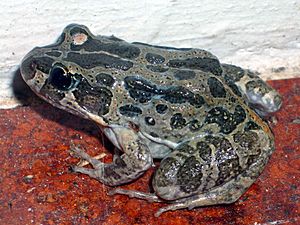Marbled frog facts for kids
Quick facts for kids Marbled frog |
|
|---|---|
 |
|
| Conservation status | |
| Scientific classification | |
| Synonyms | |
|
The marbled frog is also called the marbled marsh frog. Its scientific name is Limnodynastes convexiusculus. This frog lives on the ground. You can find it in northern and north-eastern Australia. It also lives in southern New Guinea, in both Indonesia and Papua New Guinea.
Be careful not to mix it up with another frog! The spotted grass frog (Limnodynastes tasmaniensis) used to be called the "marbled frog" in South Australia. But they are different species.
Contents
What Does the Marbled Frog Look Like?
Size and Appearance
Adult marbled frogs are usually about 4.5 centimetres (1.8 inches) long. Some can be a bit bigger. Their toes are long and do not have webs between them.
Their skin is grey to light brown on their backs. They have many dark spots or blotches. Their belly, which is their underside, is white.
Special Features
Male marbled frogs have a yellowish throat. They also have many small, sharp black spines on their backs.
If a marbled frog feels scared or bothered, its skin can release a lot of slimy liquid called mucous. This might help protect it from predators.
Where Do Marbled Frogs Live and What Do They Do?
Habitat
The marbled frog likes to live in waterholes and pools. You can find these water spots in open grasslands and woodlands.
Behaviour
Marbled frogs usually live alone. They like to hide in thick plants on the ground. Because they hide so well, you are more likely to hear them than see them!
Male frogs often call out from hidden spots. They are usually partly covered by plants in the water. Their call sounds like a quick series of "uk uk uks."
Reproduction and Life Cycle
Marbled frogs lay their eggs in a floating foam nest. This nest is usually hidden under plants in the water. The eggs are small and brown.
When the eggs hatch, tiny tadpoles come out. These tadpoles can grow to be about 7 centimetres (2.8 inches) long.
See also
 In Spanish: Limnodynastes convexiusculus para niños
In Spanish: Limnodynastes convexiusculus para niños


